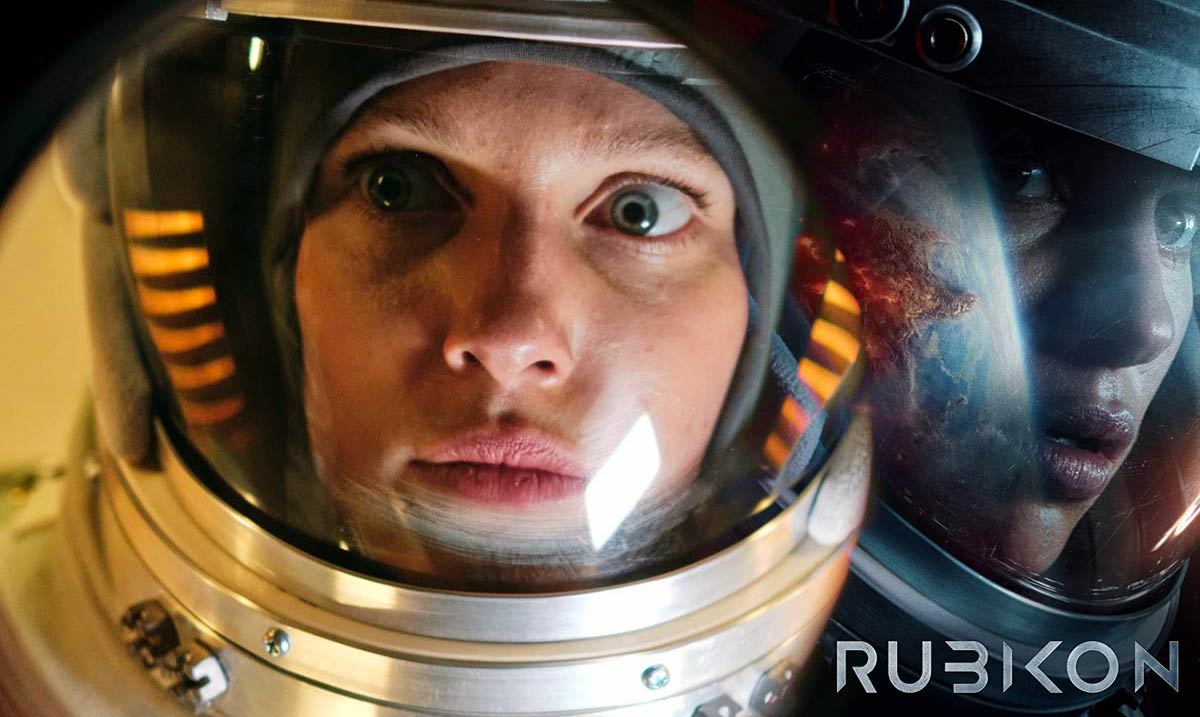We’re in a fascinating era of modern science fiction where a majority of all science fiction movies right now are about climate change and/or ecological disaster. Rightfully so, because it’s an unquestionably important topic and something that all sci-fi filmmaker & storytellers are always thinking about. It’s also good material for sci-fi stories because looking out into the future means there will be something to deal with regarding humanity’s survival, whether it be developing ways to survive and fix the climate/environment, or how to deal with the aftermath/fall out, or how people will respond when the shit really hits the fan. Rubikon is another one of these sci-fi movies directly addressing climate change, with an intriguing original concept. What if three scientists on a space station witness an apocalyptic event on Earth, leaving them as the only humans left alive? What do they do next, how do they respond? Should they go down and try to help, or not?
Rubikon is an Austrian production, made by an Austrian filmmaker named Magdalena Lauritsch. She is making her feature debut, and co-wrote the script with Jessica Lind, though it’s entirely in English with a few other languages spoken by the crew. At first we’re introduced to the original crew working the station, while a new spaceship arrives bringing two replacements – who work for one of the mega-corporations that now run the planet (because this is an accurate prediction for what is to come). The rest pack up and head back down to Earth, leaving three remaining crew – Hannah Wagner played by Julia Franz Richter, who is the protagonist of this story; wealthy, unstable schmuck Gavin Abbott, played by George Blagden; and Dimitri played by Mark Ivanir, a Russian scientist responsible for developing & managing a special algae program on the space station. The hope is this special algae will consume all the toxins while restoring a healthy balance of oxygen to Earth’s atmosphere – if they can figure out how to engineer it correctly to work.
There have been many sci-fi films recently set on space stations, from Gravity to The Cloverfield Paradox, as well as this one recently Stowaway on Netflix (which is set on a space ship but close enough). Rubikon is most similar to Stowaway, focusing less on action and spectacle and CGI, more on the dialogue within the confines of a claustrophobic space station. Endless metallic hallways and rooms filled with screens. They’re constantly arguing and discussing what to do, how to handle the situation, and what’s going to happen next. As a sci-fi nerd, and as much as the trailer didn’t really grab me at first, this film does offer an intriguing concept: what if a toxic gas (with unexplainable origins) engulfed Earth within hours, leaving most humans dead. They can see this from above, but can’t reach anyone or do anything and don’t know how to proceed. Maybe the algae can help? Maybe not? Is it even a good idea to bring the algae down there or should they just save themselves? These are the kind of conversations they’re having, with plenty of fights & confusion.
My biggest problems with Rubikon are with the script itself. As much as I enjoy the concept and the setting and the implications, the writing for the characters is a bit sloppy. At times they will repeat statements or ask questions about something that was just resolved. It’s a bit strange… They’ll also skip over important discussions entirely, making me wonder why they never talked about that. Even though I am a fan of Ridley Scott’s Prometheus, many critics wrote about how much they hated the inept science characters in that one, and this film has similar issues. For the most part, it’s easy to look past the “would a scientist really do that or say that?” issues because these people aren’t exactly scientists, at least not in the conventional sense of what we expect from astronauts. One of them is a soldier, another is a corporate worker, and the last one is a research scientist who has been on this space station for more than a decade so his charm has certainly worn off. That said, it doesn’t excuse all of the boring “but what about this?!” lines that fill the second half.
It’s a huge relief that thankfully the film ends in the best way possible. They don’t pull any cheap tricks or toss in some last minute gimmick, they don’t go for the “safe” ending or peaceful resolution. They go as far as they can with this concept of being stuck up there and, yes!, they make a choice that made me want to forget all of my previous criticisms and say thank goodness this is what they decided to do with the script. Phew. We need more sci-fi that boldly, accurately, and intelligently challenges us with reasons to wonder what is right or wrong and what should humans do. Without the happy-go-lucky Disney ending. Without worrying about if every audience member like that ending. And we need this kind of discussion to encourage us – as human beings still alive on this planet – to ask what we can really do to stop the impending climate disaster. Can some algae or some scientific experiment save us, or is it up to just a few humans to make the right choice? What even is the right choice…? Watch Rubikon to see what they decide and then talk about it.

No responses yet